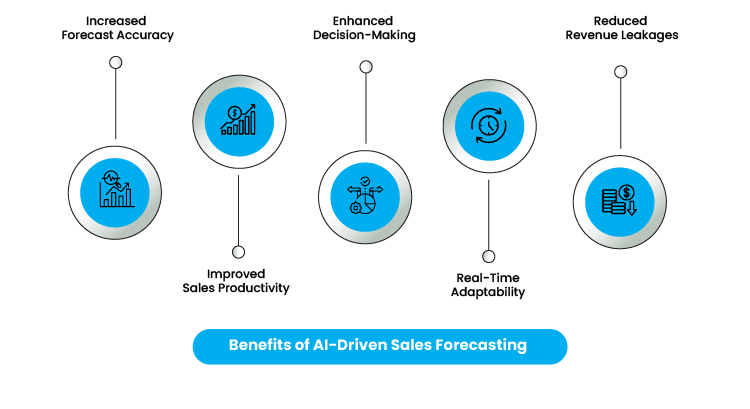

ACL Digital
10 Minutes read
Salesforce and AI: Driving Sales Performance with Intelligent Forecasting
In today’s competitive business landscape, sales organizations are under immense pressure to meet targets, optimize processes, and maintain a competitive edge. With the prompt advancement of technology, Artificial Intelligence (AI) is becoming an essential tool for sales teams. When integrated with Salesforce, AI not only transforms sales forecasting but also redefines how sales teams operate, interact with customers, and make strategic decisions. This comprehensive guide explores how Salesforce and AI can enhance sales performance through intelligent forecasting, highlighting key benefits, practical applications, and strategies for successful implementation.
The Evolution of Sales Forecasting
Sales forecasting has always been a significant component of business strategy, enabling companies to plan resources, set realistic goals, and gauge performance. Traditionally, sales forecasts were based on historical data, market trends, and intuition. While this method provided a general direction, it often fell short in terms of accuracy and reliability.
The advent of AI has revolutionized this process. AI-powered forecasting leverages advanced machine learning models and algorithms to analyze massive amounts of data that includes historical sales figures, customer behaviors, market trends, and even external economic factors. This allows businesses to generate highly accurate, data-driven forecasts that can adapt to changing market conditions in real time.
Why Salesforce + AI Equals Superior Forecasting
Salesforce, a leader in CRM solutions, offers robust tools for managing customer relationships, tracking sales activities, and generating reports. However, when combined with AI, Salesforce becomes a powerhouse for predictive analytics and intelligent decision-making. Salesforce Einstein, the AI layer within Salesforce, transforms raw data into actionable insights, enabling sales teams to predict outcomes, prioritize leads, and make informed decisions with confidence.
Key Benefits of AI-Driven Sales Forecasting
AI-driven sales forecasting offers significant benefits by enhancing accuracy, improving productivity, and enabling proactive decision-making. It analyzes vast datasets including CRM records, customer behaviors, and market trends to generate precise, real-time predictions. This reduces reliance on manual, subjective forecasting methods and helps sales teams prioritize high-potential leads, optimize resource allocation, and identify potential revenue bottlenecks early. Additionally, AI-driven insights support better strategic planning and agility, allowing businesses to respond swiftly to market changes and achieve sustained growth.

Increased Forecast Accuracy
Traditional sales forecasting methods often rely on subjective inputs and limited data sets. AI eliminates these biases by analyzing comprehensive datasets, including CRM data, social media interactions, email correspondences, and more. This leads to forecasts that are not only more accurate but also adaptable to real-time changes.
Improved Sales Productivity
By automating routine tasks such as data entry, report generation, and lead scoring, AI frees up valuable time for sales reps to focus on high-priority activities like building relationships and closing deals. Salesforce Einstein, for example, can automatically prioritize leads based on their likelihood to convert, ensuring that sales teams invest their efforts where it matters most.
Enhanced Decision-Making
AI provides sales managers with deep insights into sales performance, pipeline health, and customer behavior. These insights enable better decision-making around resource allocation, pricing strategies, and marketing investments, ultimately leading to more effective sales strategies.
Real-Time Adaptability
The business environment is dynamic, and sales forecasts need to reflect these changes. AI-powered forecasting tools like Salesforce Einstein analyze real-time data and adjust predictions accordingly. This agility helps businesses respond quickly to market shifts, competitive pressures, and evolving customer needs.
Reduced Revenue Leakages
AI helps identify potential bottlenecks in the sales process, such as deals that are likely to stall or customers who may churn. By proactively addressing these issues, businesses can reduce revenue leakages and optimize their sales operations.
Practical Applications of AI in Sales Forecasting
AI’s capabilities extend far beyond basic forecasting. Here are some practical applications that demonstrate how AI can revolutionize sales processes:
Predictive Lead Scoring
Lead scoring is a common practice where potential customers are ranked based on their likelihood to purchase. Traditional lead scoring methods often rely on a set of predefined criteria, which can be static and inflexible. AI, on the other hand, uses machine learning models to analyze historical data and predict which leads are most likely to convert. This allows sales teams to prioritize their efforts effectively, focusing on high-potential leads and increasing conversion rates.
Salesforce Einstein’s predictive lead scoring analyzes patterns from past customer interactions and sales outcomes to score leads dynamically. It provides sales reps with a clear view of which leads to prioritize and the best ways to engage them.
Opportunity Insights and Predictive Analytics
AI can provide deep insights into ongoing sales opportunities by analyzing customer interactions, deal progression, and external factors such as market trends. This predictive analysis helps sales teams understand which deals are most likely to close and what steps need to be taken to accelerate the sales cycle.
Einstein Opportunity Insights helps sales teams identify key opportunities by analyzing the history of similar deals, customer sentiment, and competitor activities. It also provides recommendations for the next best actions, helping sales reps engage more effectively with prospects.
Sales Pipeline Management
Managing the sales pipeline is crucial for ensuring a steady flow of revenue. AI can monitor the health of the sales pipeline in real-time, identifying potential issues such as stalled deals or unqualified leads. It can also suggest corrective actions to keep the pipeline moving smoothly.
Salesforce’s AI tools can automatically analyze pipeline data to identify at-risk opportunities and suggest strategies to re-engage those prospects. This proactive approach helps sales managers maintain a healthy pipeline and forecast revenue more accurately.
Customer Behavior Analysis
Understanding customer behavior is key to effective sales strategies. AI can analyze patterns in customer interactions, purchase history, and preferences to predict future behavior. This information can be used to tailor sales pitches, create personalized offers, and build stronger customer relationships.
Salesforce’s AI capabilities can analyze customer behavior across multiple channels, providing sales teams with a 360-degree view of the customer. This holistic view enables personalized engagements that resonate with customers, leading to higher satisfaction and loyalty.
Automated Sales Coaching
AI can also play a significant role in sales training and development. By analyzing sales calls, emails, and other interactions, AI can identify areas where reps may need improvement and provide real-time coaching. This helps reps refine their skills and improve their performance over time.
Salesforce offers tools that analyze communication patterns and provide feedback on areas such as language use, response times, and customer sentiment. This helps sales managers coach their teams more effectively and ensure consistent messaging.
Strategies for Implementing AI in Sales Forecasting
Successfully integrating AI into your sales forecasting strategy requires careful planning and execution. Here are some key strategies to ensure a smooth implementation:
Start with Data Quality
AI’s effectiveness is directly tied to the quality of data it has access to. Before implementing AI, ensure that your CRM data is clean, up-to-date, and comprehensive. Invest in data cleansing and enrichment processes to eliminate inaccuracies and fill in any gaps.
Define Clear Objectives
Set clear, measurable goals for what you want to achieve with AI. Whether it’s improving forecast accuracy, increasing lead conversion rates, or reducing sales cycle times, having well-defined objectives will help guide your AI strategy and measure its success.
Choose the Right AI Tools
Not all AI tools are created equal. Choose a solution that integrates seamlessly with your existing CRM and provides the specific capabilities you need. Salesforce Einstein, for instance, offers a range of AI-powered features tailored to sales forecasting and customer relationship management.
Train Your Team
AI tools are only as good as the people who use them. Provide comprehensive training to your sales team on how to use AI tools effectively. This should include not only technical training but also guidance on how to interpret AI-driven insights and incorporate them into their daily workflows.
Monitor and Optimize
AI implementation is not a one-time project but an ongoing process. Regularly monitor the performance of your AI tools and make adjustments as needed. Use feedback from your sales team to identify areas where the tools are adding value and where improvements can be made.
Challenges and Considerations
While the benefits of AI in sales forecasting are clear, there are also challenges to consider:
Customer Behavior Analysis
With AI tools analyzing vast amounts of customer data, ensuring data privacy and security is paramount. Implement robust data protection measures and comply with relevant regulations to protect sensitive information.
Integration with Legacy Systems
Integrating AI tools with existing CRM systems and processes can be complex. It’s essential to choose tools that are compatible with your current infrastructure and can be integrated with minimal disruption.
Change Management
Adopting AI requires a cultural shift within the organization. Sales teams may be resistant to change, especially if they are used to traditional methods. Effective change management strategies, including training and clear communication, are crucial for successful adoption.
Interpreting AI Insights
AI tools generate a wealth of insights, but interpreting these insights and translating them into actionable strategies can be challenging. Invest in training and tools that help sales managers and reps make sense of AI-generated data.
The Future of Sales with AI
As AI technology continues to evolve, its impact on sales forecasting and performance management will only grow. Future advancements may include even more sophisticated predictive models, deeper integration with other business systems, and more intuitive user interfaces that make AI accessible to all sales professionals.
Businesses that embrace these innovations and continue to refine their AI strategies will be well-positioned to outperform their competitors and achieve sustained growth. By leveraging the power of AI and Salesforce, companies can unlock new levels of efficiency, accuracy, and customer engagement, paving the way for a new era of sales excellence.
The integration of AI with Salesforce is revolutionizing sales forecasting, offering unprecedented levels of accuracy, efficiency, and strategic insight. By adopting AI-driven forecasting tools like Salesforce Einstein, businesses can enhance their sales performance, optimize resource allocation, and build stronger customer relationships. Whether you are looking to improve lead conversion, streamline sales processes, or gain deeper insights into customer behavior, AI offers powerful solutions that can drive your business forward.
To stay competitive in today’s dynamic market, it’s essential to embrace these technologies and develop a robust AI strategy tailored to your unique business needs. With the right approach, ACL Digital helps enterprises transform their sales operations. For more information, get in touch with our experts at business@acldigital.com.
Related Insights



How Generative AI is Transforming Project Risk Management

Death to Prompting! Long Live Programming!

The Architecture of Agentic RAG: Reasoning-Driven AI Systems Explained

